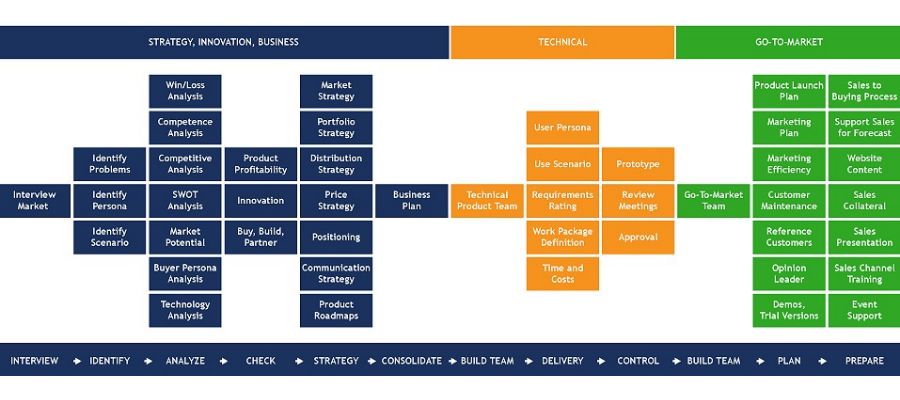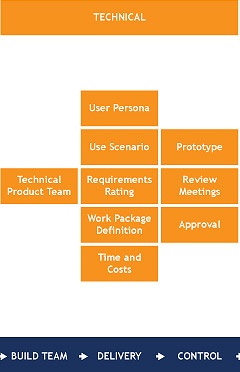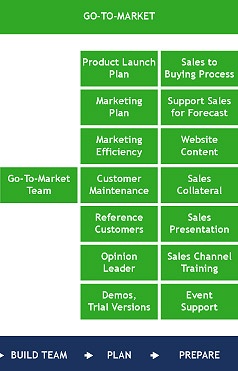
What is Product Management? Skills & Responsibility of Product Manager
What is Product Management?
Product managers and companies keep asking us, what are the product management tasks? What to do when? Why do I have to do this and that?
First of all, let’s ask ourselves the question: Why is this question asked so often?
As we keep finding, most product managers have previously worked in engineering, marketing, or sales. One day you suddenly become a product manager in your company because nobody else is there.
If the company is technically oriented, user stories, requirements, and technical specifications are usually mentioned as product management tasks. Market statements and sales support are often mentioned in companies with strong sales and marketing.
On the other hand, discussions with managing directors often show a lack of trust in product management because the information that management needs for decisions needs to be more adequately supplied in both cases. As a result, management needs a sufficient basis to make decisions about investments and long-term strategies.
Ultimately, it leads to product management needing more time and time and being quite dissatisfied with its situation and job.
But why is nobody in companies familiar with the tasks of product management?
As we learned at the beginning, almost all product managers come from other departments. Still, people need a real product management education explaining what has to be done, when, and how.
Nurses, bricklayers, and police officers receive training, and everyone knows their duties and what they have to do when.
A product manager’s activity significantly influences company decisions by hundreds of thousands or even millions of euros. All without training and with a lack of knowledge of the task.
Define complete product management tasks with the help of the Open Product Management Workflow™
To explain the tasks of the product managers more easily, we use the Open Product Management Workflow ™ for help. Incidentally, the Open Product Management Workflow™ was developed by Experts, who have repeatedly experienced practical work with product managers in companies where colleagues always find it difficult to do tasks and sequences precisely at this point.

Let’s take a look at the workflow. At first glance, many boxes contain individual product management tasks. These task boxes are divided into three colors. Each color represents a task section, which also describes the job and role of the respective product manager.
The blue section includes all strategic, innovative, and business product management tasks. This section or activity is, therefore, also referred to as “strategic product management.”
All tasks in this section aim to help derive strategies based on market facts and create decision templates.
Incidentally, everything done in this strategic section also creates the basis for all other activities and sections, such as technical product management and the go-to-market.
The time that product management invests in the tasks of the strategic part reduces the time wasted on tactics.
As a product manager, you start where you get the most information, namely, with the customer. The task is to find out which problem costs the customer time and money and whether he is willing to pay money for a solution to this problem.
It is important to find a balance between your customers, the customers of the competition, and the potential ones.
The individual tasks were grouped into phases in the Open Product Management Workflow™ – see the bottom bar for easier orientation.
![]()
The interview phase is always followed by identifying the problem, persona, and scenario. This is followed by the analysis phase, which is important for the subsequent derivation of the individual strategies.
The phase check helps to determine the business’s success with the help of key performance indicators and to check the type and value of the innovations. The phase check also helps to answer the question Build, Buy, or Partner? i.e., develop it yourself, buy it, or partner it. The last point, Buy, Build, or Partner, does not only refer to technology but can also affect decisions regarding markets, sales, and communication channels.
All strategies can now be derived from all information resulting from these product management tasks.
The last step in strategic product management is the consolidation phase, i.e., the summary of the results and derivations in the form of a business plan with calculated figures and the business case.
To ensure that only market facts that can be constantly and dynamically adjusted are consolidated in the business plan, product managers receive seminars in our product management templates and tools, such as the “Agile Business Plan™” developed by us. With these templates and tools, it is possible to carry out each product management task so that the results flow into a fact-based decision template.
Technical product manager duties

The orange section of the Open Product Management Workflow ™ includes all the tasks of a technical product manager or the tasks of a product owner.
First, this section begins with establishing and convening a technical product team.
With this point, the product manager’s tasks suddenly expand because, in addition to the product, the product manager is responsible for forming, informing, and managing virtual teams. The virtual teams are the technical product team and the go-to-market team.
Experienced product managers know that they do not manage a product but that a very important task of the product manager is to form, inform and manage the virtual product teams.
The technical product team jointly fulfills product management tasks such as defining user persona (user persona).
All strategic product management tasks must be fulfilled to set up use scenarios and evaluate requirements and work packages for a 100% marketable product with the help of our requirement scheme. Suppose the strategic product management tasks have yet to be completed adequately. In that case, there will always be inquiries from development, management, or sales that will often change the prioritization, or the product manager will be pushed to do so. This leads to dissatisfaction in development and with the product manager himself.
Tasks Go-To-Market and Product Marketing

The green section of the Open Product Management Workflow™ includes all the tasks that must be completed for a successful Go-To-Market.
In the case of go-to-market, too, the product manager is again first the manager of a virtual team, namely the manager of the go-to-market team. For most tasks, the product manager will provide the information that message. The specialists will take on the design of the packaging, advertisements, and technical demos, but they depend on the product manager’s input.
Here, the results from strategic product management also serve as a prerequisite for a successful go-to-market. These results are necessary to formulate and deliver the right market message, i.e., the added value for each buyer persona of the respective market segment. The result of the product management tasks from the strategic part is also reflected in the sales materials and the company’s website.
Do you want your sales to conclude more quickly and assert yourself against the competition? Then he needs the arguments that show the buyer persona what problem is being solved for them and how they are saving time and money.
Who do sales get the arguments for each buyer persona from?
I think you know.
As you can see, product management tasks are multifaceted, not just business or technical.
If you want a deeper insight into the tasks of a product manager and want to learn the tools that enable product managers to carry out all tasks professionally, then visit our product management training courses and let yourself be trained to become a professional leader of your product.
Who is a Product Manager?
The product manager profession is part of operational marketing and can be found in almost every company in various industries. The product manager is responsible for planning, coordinating, marketing, and controlling the products and services to be marketed – from the launch of a new product to the further development of existing products and services. As the interface between marketing, sales, production, and development, the product manager focuses on customer needs and uses this as a basis to determine the corresponding product requirements. The increasing globalization and digitization play product managers into the cards because companies have to face these challenges and continuously develop. – The product manager is also in demand here. Career entrants usually start as junior product managers and are promoted to senior product managers throughout their careers and with the appropriate qualifications. That means not only a higher salary but also more responsibility. Management positions in marketing or sales management can also be obtained. Internationally operating companies often have to look abroad.
What skills does a Product Manager need?
Depending on the industry, company, and product, product managers are deployed in either strategic or technical product management. For the product manager to do his job successfully, he must understand the product or service in every detail. It is very important in this professional field to identify with the industry. The product manager has to understand business relationships and needs a well-founded understanding of marketing because it is important to effectively play the keyboard of the marketing mix depending on the product phases. For the product manager to be able to steer his projects actively and purposefully, he also needs special method know-how and tools for professional process control.
In addition to his technical knowledge, the product manager scores with a variety of social skills, such as excellent communication and negotiation skills, as his work thrives on working in a team and with different areas of the company. It is common for the product manager to face the challenge of getting different departments with different interests to work together. Empathy, argumentation skills, and persuasiveness are required in cases like these so everyone involved ultimately pulls together. In addition, the product manager’s task is to work creatively, think innovatively, and act with foresight. Internationalization leads to new forms of work across national borders. For this, the product manager needs a sound knowledge of English. A certain willingness to travel is also one of the product manager’s requirements to visit and coordinate global company headquarters. Especially in technical product management, programming knowledge or tool skills are often important prerequisites for this job. In particular, to manage software development project, programming knowledge or tool skills are often important prerequisites for this job.




